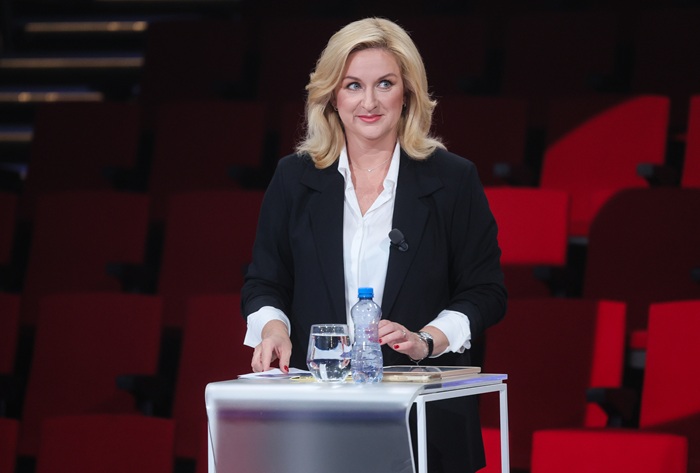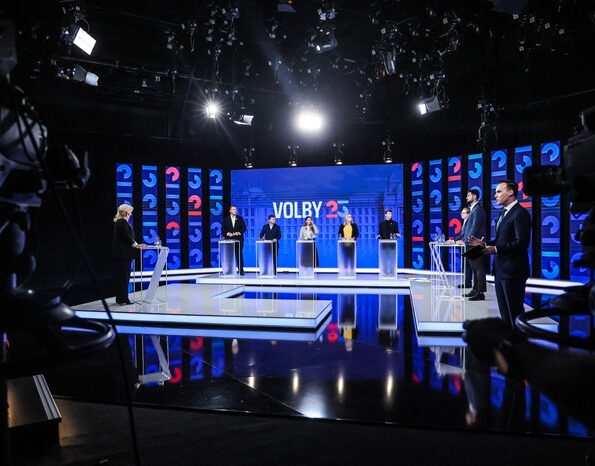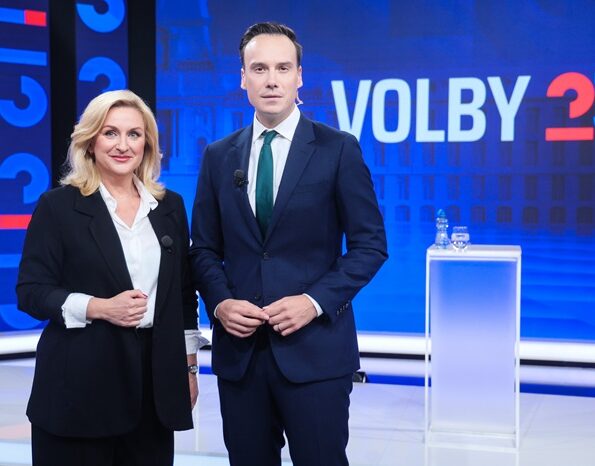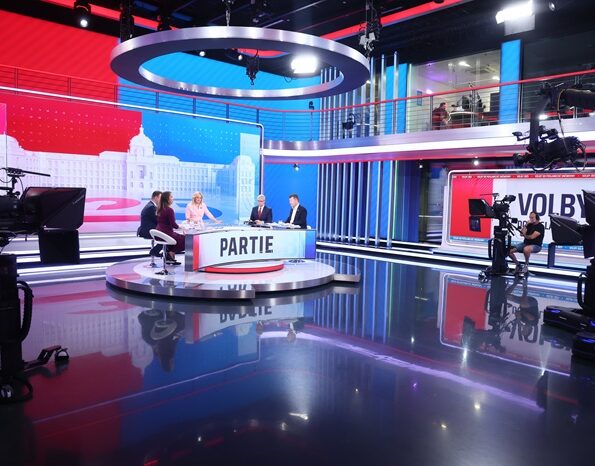CNN Prima News’ pre-election coverage is entering its final phase. Viewers can expect the concluding debates featuring representatives from the strongest political parties. On Thursday, September 25th, representatives from the seven leading parties will participate in a debate, followed next week by two super duels between the top four parties, based on the latest election polls. The debates will be hosted by Terezie Tománková, with data and context provided by Petr Suchoň. The series of pre-election debates will be followed by special election day coverage and post-election analysis.
For Terezie Tománková, this will be her second time hosting debates before parliamentary elections, although she has been hosting political discussion shows for over ten years. At Prima, she is the face of the Sunday debate programme Partie Terezie Tománkové and is considered one of the prominent figures in domestic political journalism.
In the interview, she describes being prepared for practically anything that live pre-election debates might bring. “I always have to be ready to throw the script out the window if the situation demands it,” she says. She also admits that due to the declining political culture in the Czech Republic, the behaviour of politicians in TV debates has become coarser. Nevertheless, her main goal is to lead discussions fairly and in a way that allows viewers to clearly understand the plans and ideas of individual politicians. “We’re not choosing the most entertaining person, but someone to whom we entrust great power over our lives,” she explains.
Pre-election coverage on CNN Prima News began already in mid-August and is now heading into the final week. Viewers will gradually watch a super debate of the strongest parties and the final two super duels featuring the leaders of the top four. Do you feel that this year’s elections are being approached differently on CNN Prima News compared to four years ago?
I feel that this year’s election coverage is bigger than four years ago; we have more debates, and thus bring more topics. Over the past four years, the station has also made significant progress, and it’s clear that viewers are interested in politics. A new feature this time is two major pre-election duels, which were not held in 2021. Back then, we first had a broad-spectrum debate with eight parties and then a debate with the top four according to polls, which resulted in one duel. This time, we approach it differently: we have a debate with representatives of the seven strongest parties according to the Stem agency and other relevant polls. Following that, next week, there will be two big duels—first between the leaders of the third and fourth strongest parties, and finally between the top two, Andrej Babiš and Petr Fiala.
Besides the mentioned debates, you will also be the host throughout the election Saturday, and on Sunday, you will host the post-election show Partie Terezie Tománkové. That’s a broad scope, requiring extensive preparation. What is the most important thing for you when you are getting prepared?
Honestly, it’s that I have been deeply involved in politics for the full four years. Every week, except for the summer holidays, I follow politics and host two-hour political debates, as well as European debates with multiple participants. Politics is my daily agenda, both professionally and in my free time. Without this experience, I wouldn’t have taken on the pre-election debates and election coverage at all.
Politics is my daily agenda, both professionally and in my free time. Without this experience, I wouldn’t have taken on the pre-election debates and election coverage at all.
Terezie Tománková
If you compare today’s preparation with the one you went through in the years when you were starting, or with the preparation for the debates four years ago, is it different?
The experience I’ve gained helps me, but I’m more aware now that it’s not just about me, but also about the people who come to the debate. That’s why I watch in advance how they communicate, how they argue, and what they talk about. And I have changed too. I’m older, hopefully more experienced. But honestly, I don’t fully remember how I prepared before. I hosted debates on parliamentary elections four years ago for the first time, and since then, a lot has changed. Society has become more polarised, social media works differently, and campaigns are different today as well.
Over the past four years, many events have taken place, so there are plenty of topics to discuss. But in a pre-election debate, you have limited time and must present the candidates as fairly as possible. What criteria do you use to select the topics? Do surveys help you with this?
Surveys are important because they tell us what people care about and what they see as threats. Socioeconomic issues have long emerged as key topics, and it’s clear that people vote with their wallets. It’s not just about how much money they actually have, but more about whether they feel wealthy and what the general mood in society is. This largely shapes both the debate and the entire campaign. Just look at today’s rhetoric: some claim the government has brought the country to ruin, while others warn that without their vote, we’ll fall under Putin’s influence. Meanwhile, there’s the war, discussions about defence spending, and the overall geopolitical situation. These are the core issues where fundamental clashes of opinion happen.
You can’t just ignore current events either. To what extent do you want to incorporate them? For example, the topic of the Dozimetr scandal recently came up in court. Will you take that into account?
We can’t leave it out. That topic enters the debate, and we have to reflect on it. It’s a scandal that sticks to certain parties—more to one than the others—and if we don’t mention it, the political opponents will bring it up anyway. Back in 2021, it was the Andrej Babiš chateau scandal that exploded in the media on the very day of our debate. I was hosting a big discussion with Andrej Babiš, and the information came out just 20–30 minutes before it started. That’s every presenter’s nightmare because we had to bring the topic into the show without having time to prepare.
Do such revelations ruin the planned structure of the debate?
We try to prevent that from happening. Of course, it partially disrupts the intended structure, but the task is to steer the debate back to the planned course.
And if the debate becomes heated or veers off course, do you sacrifice some of the prepared topics?
We will try to cover all the essential topics. There’s a fair amount of time, but it’s up to us to keep track of when a topic has been discussed enough and it’s time to move on. Politicians tend to return to what they want to emphasise, so it’s up to me to steer the debate in a way that ensures all the major issues are addressed.
How much room is left for your improvisation in the studio?
Significant. And I’m not distinguishing whether it’s a pre-election debate or the regular Sunday Partie. I always have a script prepared, but at the same time, I’m ready to throw it out completely if the situation takes a different turn. Improvisation is simply part of the job. With major debates involving seven guests, though, I try to keep a firmer grip on the reins, so the discussion doesn’t fall apart.
What is easier for you: managing seven guests or just two?
These are completely different formats. I’m looking forward to both. But two-person debates are perhaps a bit easier for the host.
Can you reveal what the debates will be about? And do the politicians know the topics in advance?
Yes, they know the topics in advance. We stick to a proven framework, selecting themes like living standards and security. This includes the economy, money, pensions, taxes, the geopolitical situation, and the general programme promises of the parties. The debate also involves the fact that two major groups likely to enter the Chamber of Deputies promise referendums not only on the EU but also on NATO, which is always a flashpoint. Under the two main topics—economy and security—there’s really a lot to cover, including the question of aid to Ukrainians in our country. Election programmes themselves tend to be more general and less specific nowadays. They are interchangeable, but we will base the debates on them and confront politicians with their content.
What are your personal expectations for the final stretch of the pre-election broadcasts? Do you expect the super duels to be more intense?
My expectations aren’t very high. But they don’t really matter. Mentally, I’m preparing for absolutely anything. The only thing I can do is to dive even deeper into following politics. I try to watch all possible media appearances of politicians, all their participation in debates, I follow interviews on competing TV stations, politicians’ statements on social media—basically wherever they appear. I want to know where they stand mentally, what their motivations and arguments are. So right now, I’m living through watching an enormous number of debates, duels, and interviews, which are increasing every election. I watch them to be prepared for their reactions and to know what to expect. But I still have to be ready for extreme situations.
Even for situations where someone might walk out of the studio.
That must be taken into account as well.
And how do you respond in such a moment?
I don’t know in advance. These are spontaneous decisions. It’s live broadcasting, and anything can happen there.
Do you think that pre-election debates influence voters and have an impact on their decision-making?
I don’t have the necessary data for that. But I definitely don’t think we are in the situation that some media predict, and that major media have lost their significant role. Many people still watch televised debates. For example, the duel between Petr Fiala and Andrej Babiš, the two main political rivals, has practically not happened during the entire election period. If I remember correctly and am not mistaken, their last direct confrontation was here on CNN Prima News before the European Parliament elections in June last year. Since then, they haven’t publicly debated with each other. So viewers will certainly want to see their live confrontation. Until now, they have only seen fragments, like one attacking the other at rallies or on social media. The real interaction between them hasn’t happened for a long time. I think people will be interested. Moreover, there is still a large number of undecided voters — according to surveys, up to around thirty per cent. It looks like many of them will decide only at the last moment, literally in the voting booth.
Do you personally go to vote?
Yes, I do. So far, I’ve always participated in elections. This year, making a decision is a bit harder for me, but I have a first-time voter at home. My daughter will be voting for the first time this year, and I will definitely accompany her to the polls.
Can you, as a presenter, separate your voting preferences from your professional role?
Yes, I can. I’m able to ask unbiased and tough questions while still voting. I do vote, but I don’t tell anyone who.
My expectations aren’t very high. But they don’t really matter. Mentally, I’m preparing myself for anything. The only thing I can do is to dive even deeper into following politics.
Terezie Tománková
From the media, we can infer that political culture in the Czech Republic is deteriorating. Is this also reflected in television debates?
Yes, it is. Nowadays, politicians often treat debates as a source of content for social media. They cut out fragments that work better when they are controversial, loud, or provocative. This then increases reach and likes. So, debates look different today than they did before, partly because of this.
And how does it show in the studio? Are the guests ruder?
They interrupt each other more often, talk over one another, and accuse each other of lying. In the past, it was more about arguments, but today the atmosphere often descends into shouting. Even now, in this election, I observe that some politicians use attacking as a communication strategy. I don’t need to name them—everyone can see who does it. But for the host, it becomes extremely difficult. When everyone is shouting, waving papers, and throwing quotes around, it’s harder to get them to give any answers.
Sometimes, during a debate, someone has asked me to “discipline” the politicians. But that’s not my role. I’m not there to tell grown adults, especially elected constitutional officials, how they should behave.
When during a debate emotions run high or a politician doesn’t answer the question, when is the right moment to interrupt the guest?
Politicians often blame hosts for interrupting them. But it’s our job. We don’t do it because we are rude; we do it because politicians often don’t answer, dodge the topic, or start repeating themselves. Lately, there have been many calls to measure the speaking time of participants in debates. But in my opinion, even that doesn’t really show whether someone is advantaged or not. Everyone communicates differently—some answer quickly and briefly, others are more long-winded. Timing only really makes sense to monitor for the final message to voters, to keep it fair. Otherwise... for example, in presidential debates, Andrej Babiš was much more detailed, while Petr Pavel answered factually and concisely. In that case, measuring time simply wouldn’t work.
Nowadays, politicians often treat debates as a source of content for social media. They cut out fragments that work better when they are controversial, loud, or provocative.
Terezie Tománková
How do you perceive your role in the pre-election debates? What do you consider your main task?
In pre-election debates, the main goal is to ensure fairness, clarity, and direction of the discussion. Simply put, to moderate the debate. It’s also about not letting lies go unchallenged and making sure you get an answer. If I ask what time it is and the politician replies “Thursday,” I can’t just move on to the next question.
I strive to make the debate valuable for viewers, so they learn something meaningful and can compare the motivations and ideas of the individual politicians. Because this isn’t a reality show. We’re not choosing the most entertaining person, but someone to whom we entrust great power over our lives and over the enormous amount of money the state collects in taxes. Voters should have the chance to consider what a government led by these people would look like and how they would handle potential crises. The previous government faced COVID; this one is dealing with the war in Ukraine and the energy crisis. None of this could have been imagined during the last elections. But it happened. And the people we elect will decide how to handle such challenges. That’s what it’s about. These are serious matters, not a reality show.
Terezie Tománková, presenter, CNN Prima News
She started he career at the regional Zlín television station Emurfilm as a news presenter. In 2000, she joined TV Prima’s news department as a reporter and parliamentary correspondent. Since 2014, she has been the host of TV Prima’s main news programme called Partie, which was renamed Partie Terezie Tománkové in May 2020 following the launch of CNN Prima News. She is also the author of the book Rozhovory Terezie Tománkové (Interviews by Terezie Tománková), in which she presented personal stories of notable Czech women from various fields.
Source: mediaguru.cz




